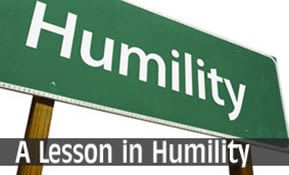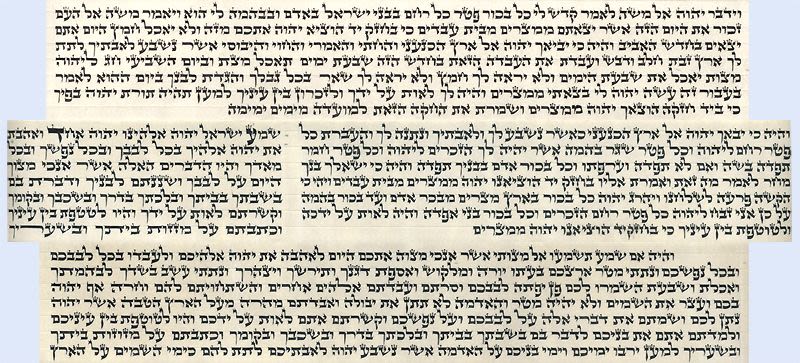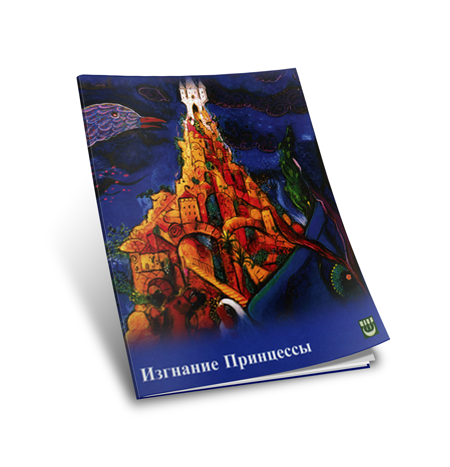
Beshalach: The Merit of the Righteous
What were their weapons? The remains of Yosef! A righteous person is a shield for his people, and the "righteous are even greater in death than in life."

"And the children went up armed out of the land of Egypt, and Moshe took the bones of Yosef with him" (Shemot 13:19).
What were their weapons? The remains of Yosef, for the merit of a righteous person serves as a shield for his people, and the "righteous are even greater in death than in life." (Torat Moshe)
Togetherness
"Behold, Egypt was pursuing them" (Shemot 14:10)
Rashi notes that when referring to the Jews' camping at Mt. Sinai, the word "camped" is written in the singular because they were "like one person, of one mind." At Sinai, the Jews united ideologically to receive the Torah. Were that this was always true. Yes, we unite during tragedies, but as Rabbi Avraham Bornstein, the Avnei Nezer explains, this is similar to the herd instinct. Where is the unique togetherness that bound our ancestors at Sinai? Where is the realization that we are all one people? Where is the understanding that "Israel, the Torah and God are one" and that what binds us together far outweighs our differences? Why can't we rise above those ego drives which are ultimately responsiveness for our divisiveness? The Baal Shem Tov said, "I wish I had the love for the great Tzaddik (righteous person) that God has for the worst Rasha (sinner)." Even with his incomparable love, devotion and willingness to sacrifice for others, the Baal Shem Tov felt that he was nevertheless deficient in his love for others. What, then, are we to say when we allow trivia to divide us and permit self-interest to destroy our unity? We must begin somewhere. Let us examine ourselves, and begin working today towards the goal of true unity. (Rabbi Abraham Twerski)
The Four Factions
“And God said to Moshe: "Why do you cry out to Me? Speak to the children of Israel, that they go forward?” (Shemot 14:15).
Standing before the Red Sea, the children of Israel were divided into four factions.
One faction said: "Let us cast ourselves into the sea." A second faction said, "Let us return to Egypt." A third said, "Let us wage war against the Egyptians." A fourth said, "Let us cry out to God."
Thus Moshe said to the people: "Fear not; stand by and see the salvation of God, which He will show you today. For as you have seen Egypt this day, you shall not see them again any more for ever. God shall fight for you, and you shall be silent" (Shemot 14:13-14).
To those who said, "Let us cast ourselves into the sea," he said: "Fear not; stand by and see the salvation of God." To those who said, "Let us return to Egypt," he said: "As you have seen Egypt this day, you shall not see them again any more for ever." To those who said, "Let us wage war against them," he said: "God shall fight for you." And to those who said, "Let us cry out to God," he said: "And you shall be silent." (Mechilta)
These "four factions" represent four possible reactions to a situation in which one's divinely-ordained mission in life is challenged by the prevalent reality.
One possible reaction is: "Let us cast ourselves into the sea." Let us submerge ourselves within the living waters of Torah; let us plunge into the "sea of the Talmud," the sea of piety, the sea of religious life. Let us create our own insular communities, protecting us and ours from the Godless world out there.
At the other extreme is the reaction, "Let us return to Egypt." Let us accept "reality," recognizing that it is the Pharaohs who wield the power in the real world. We'll do whatever we can under the circumstances to do what God expects from us, but it is futile to imagine that we can resist, much less change, the way things are.
A third reaction is to "Wage war against them" — to assume a confrontational stance against the hostile reality, battling the "unGodly" world despite all odds.
A fourth reaction is to say: It's wrong to abandon the world, it's wrong to succumb, and it's wrong to fight. The answer lies in dealing with it on a wholly spiritual level. A single prayer can achieve more than the most secure fortress, the most flattering diplomat or the most powerful army.
God rejected all four approaches. While each of them has their time and place (it's important to create inviolable sanctums of holiness in a mundane world; it's also necessary to appreciate the nature of the prevalent reality and deal with it on its own terms; it's also necessary to wage an all-out war against evil; and it's always important to recognize that one cannot do it on one's own and appeal to God for help) — neither of them is the vision to guide our lives and define our relationship with the world we inhabit.
Rather, when the Jew is headed toward Sinai and is confronted with a hostile or indifferent world, his most basic response must be to go forward.
Not to escape reality, not to submit to it, not to wage war on it, not to deal with it only on a spiritual level, but to go forward. Do another mitzvah, ignite another soul, take one more step toward your goal.
And when you move forward, you will see that insurmountable barrier yield and that ominous threat fade away. You will see that the prevalent "reality" is not so real after all, and that you have it within your power to reach your goal -even if you have to split some seas to get there. (The Lubavitcher Rebbe)
Miracles in Nature
"And the Children of Israel walked upon dry land in the midst of the sea" (Shemot 14:29).
People are impressed only when they see events that are truly "miraculous". They fail to realize that nature itself is a great miracle, in which they can behold God's greatness each day. (Rabbi Elimelech of Lizensk)
“And the Egyptians pursued, and went after them, all of Pharaoh's horses, and his horse-men, to the midst of the sea” (Shemot 14:23).
Shlomo Hamelech (King Solomon) wrote the following verse with his Divine inspiration: “O my dove, who is in the crevasses of the rock, in the recesses of the cliffs” (Shir Hashirim 2:14). Rashi explains that this verse refers to the time when the Jews were trapped at the Red Sea, with no avenue for escape. The massive Egyptian Army was behind them and the sea was before them. Josephus, an ancient Jewish Historian, writes that besides the 600 chosen war chariots, there were 50,000 cavalry men and 200,000 infantrymen in Pharaoh's army (Antiquities 2:15).
Why was this situation compared to a dove in the crevasses of the rocks? Rashi explains that when attacked by a hawk, the dove seeks shelter in the crevasses of the rocks. While seeking shelter from the hawk, however, it encounters a snake. The dove has nowhere to turn; it's backed against the wall. Then God said to the Jewish People in the continuation of this verse, “Let Me see your face, let Me hear your voice [in prayer]" (Shir Hashirim 2:14). God intentionally places the Jewish people – or individuals – in such circumstances. God wants us to acknowledge Him by turning to Him in prayer. When God backs a person against the wall, He is in effect calling to that person to come closer to Him. It is an expression of His love.
When confronted with a problem, we are forced to seek a solution. This search can be the catalyst for turning to God, and for that reason, God challenges us. If we don't understand these hints, God will continue to plague us with troubles until we understand, as it is written, "And with these things [the previous troubles God sent you] you will not yet listen to Me [God]; then I will chastise you yet more, sevenfold for your sins [until you acknowledge God]" (Vayikra 26:18).
The Talmud tells us that when the holy sage, Rabbi Elazar the great was ill, Rabbi Akiva rejoiced. Rabbi Elazar asked Rabbi Akiva why he was rejoicing. Rabbi Akiva responded, "I never saw you suffer. I was worried that God was rewarding you for your good deeds in this world and that you would not have a share in the hereafter. Now that you are suffering in this world, I am certain that you will have a share in the hereafter."
When a Jew attempts to come closer to God, he is trying to escape the lures of this world that are tempting him away from God. This is similar to the Jews fleeing the morally corrupt land of Egypt. The evil inclination, represented by Pharaoh and his army, pursued the Jews. Pharaoh wanted to stop them from fulfilling their spiritual aspirations. The evil inclination does the very same thing to us, throwing every possible obstacle in our path to prevent him from reaching holiness. This occurs to each person in every generation, as stated in the Passover Haggadah, "In every generation every man is required to consider, as if he himself had left Egypt." In other words, just as the Jews escaped from Pharaoh's forces through crying out to God for help, when confronted and trapped by the forces of evil, we should turn to God.
When Moshe first asked Pharaoh to let the Jews go, so they could serve God, Pharaoh refused. Later on, while in the midst of suffering from each of the ten plagues, he agreed to let the Jews leave. But the moment the plague stopped, he reneged on his promise and tried to tighten his hold on the Jews. This cycle occurred ten times until Pharaoh finally allowed the Jews to leave. And then, after the Jews left Egypt, Pharaoh tried to annihilate them at the Red Sea.
We experience this on an individual level. When we first try to come closer to God, we are challenged by the forces of evil and manage to partially subdue them. But after experiencing some relief, they rise up again and try to stop us from escaping their grip, as it states, "But when Pharaoh saw there was relief, he hardened his heart" (Shemot 8:11).
At the Red Sea, the Jews had no where to run. In the same way, when we are assaulted by evil, we feel trapped. That is the time to do whatever we can to serve God. Instead of focusing on our spiritual shortcomings and failures, we should continue praying and learning Torah.
This is the advice that God gave to Moshe as they stood before the Red Sea, "And God said to Moshe: Why cry to Me? Speak to the children of Israel, that they go forward [into the sea]" (Shemot 14:15). When attacked by the forces of evil, proceed forward.
For this reason, Rebbe Nachman always emphasized that a person must be very stubborn when it comes to serving God. A person must never allow anything to distract him from his Torah study, prayers, and the performance of good deeds. No matter how many sins he has committed, and no matter how confused his mind might be, he should be stubborn and continue serving God.
A sin is no reason to be remiss in the performance of good deeds. Each moment is distinct, and contains a separate requirement to serve God. If you sinned a moment ago, the present moment is distinct from the previous moment. The present moment has a totally new requirement to serve God. (Lekutei Halachot: Yorah Dayah: Hilchot Sheluach Hakan 4:5-7)
There are different types of evil inclinations. For most of us, the evil inclination is on a very low level – very materialistic and course. It deludes us into pursuing fantasies, illusions, foolish pleasures, and other material pursuits.
Some people have a more refined evil inclination, which does not lust after the coarse and animalistic desires of the previous level. The Tzaddikim, however, possess an evil inclination that is called a "holy angel." Although they have no desire to do something wrong, their evil inclination tricks them to be over zealous in doing good, which can cause tremendous destruction.
Depression and being sad empowers the evil inclination. When we are depressed, we become confused. Therefore, we should try to be as happy as possible to save ourselves from confusing thoughts. Joy chases away the evil inclination and confusing thoughts. Joy is our only weapon we have to fight the forces of evil, as stated in the verse, “Let the joy of God be your stronghold” (Nechemiah 8:10).












Tell us what you think!
Thank you for your comment!
It will be published after approval by the Editor.